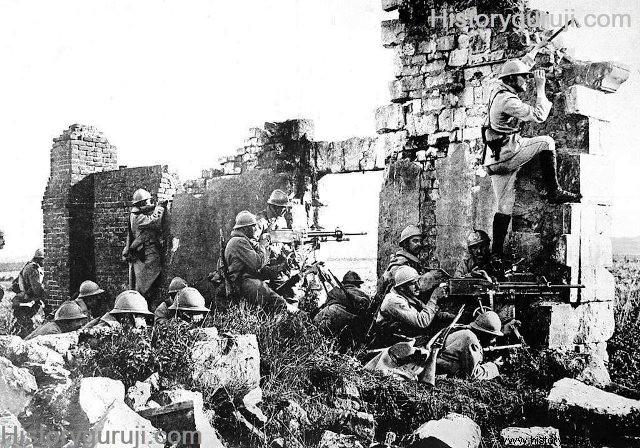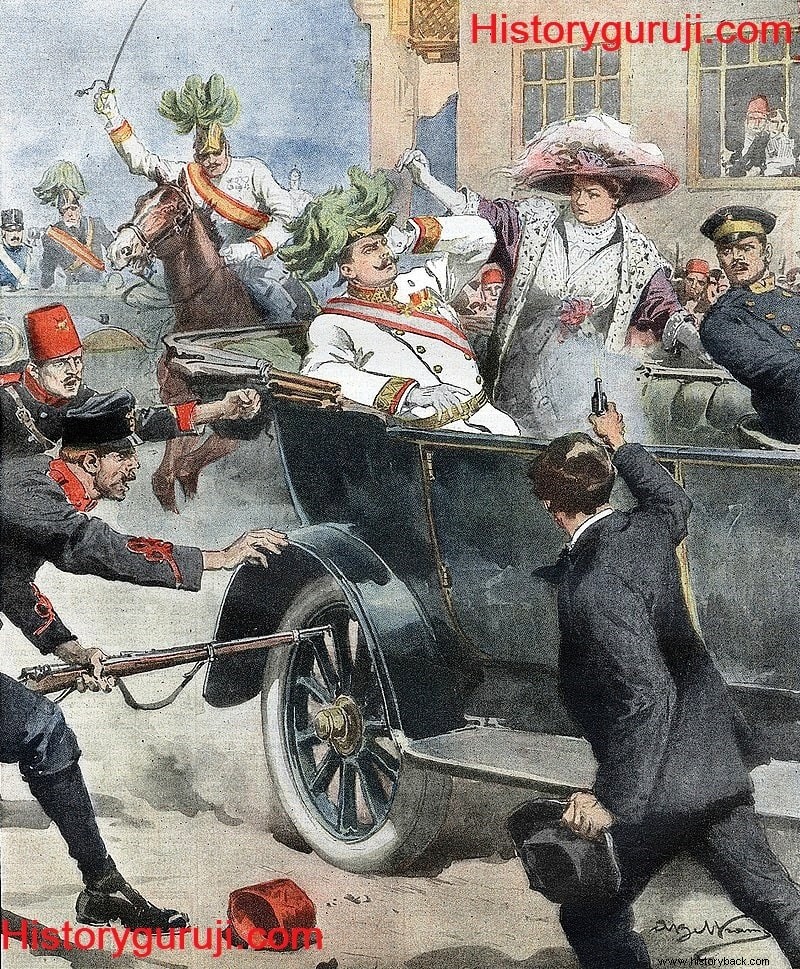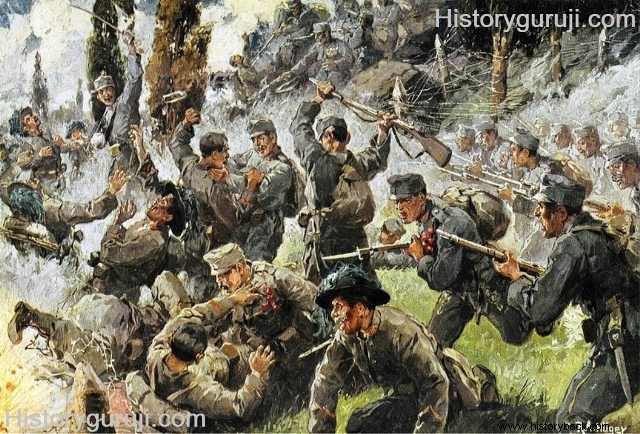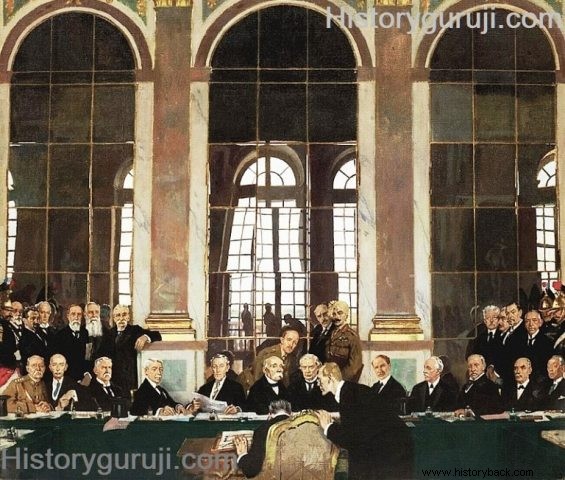The First World War, which began in 1914, is important in world history in many respects. All the wars before this were fought at the regional level, or between two or three countries. This was the first war in which almost all the countries of the world were involved and supporting one or the other side. For the first time in this war, the Gori, Peeli, Kali and Bhuri castes participated in killing each other. Above all, for the first time the flames of war spread from east to west, from north to south and from water to sky, and methods of war that spread mass massacre and terror were invented. In this war, the traditional direct attack-reversal warfare system was replaced by new military-technology and trench warfare. More than 16 million soldiers and civilians died in this world war.
Cause of First World War

The fear of world war was long ago . Bismarck 1898 AD I had predicted this war to every Belin:"I will not see the world war but you will see and it will start in West Asia." Although Bismarck betrayed Russia by taking the side of Austria at the Berlin Congress, he did not allow friendship between France and Russia as long as he remained in power.
After Bismarck there has not been a smart politician in Germany who could rectify the deteriorating situation. The world war would have actually happened in 1909 AD, if Russia had decided to face Austria on the question of Bosnia and Herzegovina would have decided. But then Russia was not in a position to fight, so the war was averted. Some of the main reasons for the start of the First World War are as follows-
Imperialist Ambitions
The causes of the First World War were very clear- the imperialist ambitions of European countries were increasing day by day due to first trade and later industrial revolution. As long as Bismarck remained in power in Germany, he did not make any effort to compete with England in this regard, but after Bismarck, Germany also made efforts to establish its own colonies. But by the end of the 19th century, the possibility of new colonies ended, due to which the colonial countries started sparring among themselves and war seemed inevitable.
Also there were some traditional imperialist desires, such as France wanted to annex Morocco, Russia wanted to annex Iran, Kustuntia, and other areas of the Turkish Empire. This led to a conflict of interest with Germany and Britain also felt a threat to its Asian colonies. Austria was also taking an interest in the matter. The combined effect of all this was that there was a fierce competition in international trade, which made Britain the most worried. When Germany wanted to control the economy of the Ottoman Empire and for this it planned to lay a rail line from Berlin to Baghdad, Britain, France and Russia were terrorized by this plan of Germany.
Political treaties and factionalism
A major cause of World War I was political treaties and factionalism. From the end of the 19th century, Europe began to split into two military groups. First in 1879, Germany made a two-nation treaty with Austria-Hungary and soon Italy joined it in 1882 AD and formed a 'tri-nation federation ' was established. Bismarck was at the peak of his power in Germany at this time and one of the main objectives of his foreign policy was to keep France isolated.
After the fall of Bismarck in 1890 AD, there was a treaty between France and Russia in 1894 AD. England was still following a policy of splendid isolation, but at this time it was forced to think that it is the only country in the powers of Europe which is alone and in such a situation if there was a war with any country then how much would be the situation. It will be deplorable. Therefore, England also abandoned its isolationist policy and made a treaty with Japan in 1902 AD. After this, in 1904, a treaty was also signed between England and France. Similarly, in 1907, France, Russia and Britain formed a 'heartfelt Trilateral Friendship Association in opposition to the Tri-Nation Union. ' and the whole of Europe was divided into two military groups. On the one hand Germany, Austria and Italy in the Union of Tri Nations On the other hand, France, England and Russia in the heartfelt friendship union Were. After the start of the World War, Italy, seeing the victory of the Allies, changed its course and joined the war against the Threesome in 1915 AD on the temptation of the Allies. It was clear from such factionalism that now even a small dispute can take the form of a world war.
The spread of militarism
European countries had an arms race since the beginning of the 20th century. The conflicts for colonial and commercial domination outside Europe and issues of ethnic polarization, traditional hostility, etc., led to an arms race in European countries and intensified military activities. Mass recruitment, mass production of lethal weapons, and intellectual efforts to glorify wars created a war mentality across Europe. Treatsky His creation 'Politics ’ He appreciated the principle of ‘Power is Right’. Philosophers in France also encouraged a similar militaristic spirit. Thus the fierce spirit of militarism was pushing the European nations towards continuous war.
In addition, newspapers published in different countries also played an important role in the start of the war, which provoked public sentiment and made it impossible to control the situation. Thus one of the reasons for the war was also to corrupt the ideology of the people by newspapers in all the big countries.
Spirit of Nationalism
European countries had conflicts over colonization and trade, but some internal factors also proved to be very important. The spread of radical nationalist sentiments in various countries in Europe played an important role not only in starting the world war, but also in the extension of the world war. Russia launched a polarization movement based on the Slavic race, with plans to merge several Balkan countries of the Turkish Empire with Russia, and the leadership was handed over to Serbia. The people of the Slavic race also lived in Austria-Hungary, so he felt more threatened. Other European powers also became concerned with Russia's Sarvaslav movement. Like Russia's Sarvaslav movement, Germany also has 'AllGerman The movement was going on, whose aim was to unite the Germans living in different states of Europe under one great Germany. This fierce feeling of nationalism resulted in political chaos throughout Europe.
territorial problems
The province of Alsace and Lorraine had long been hostilities between France and Germany. France wanted to avenge its defeat at the hands of Germany in 1870-71 AD and also wanted back its lost territories - Alsace and Lorraine. In France, Alsace and Lorraine were considered symbols of the victory of Louis XIV. In addition, it was also of economic and industrial importance due to the iron mines in Lorraine.
Bosnia and Herzegovina had problems like Alsace and Laren. In 1878, by the Treaty of Berlin, these two provinces were given to Austria for administration, but Austria could not merge them into its state. But Austria merged both the territories in its own state in 1908 AD, defying the Berlin Treaty. Since Bosnia and Herzegovina was predominantly Slavic race Therefore, Serbia opposed this act of Austria. Russia was not yet ready for war, otherwise the world war would have started right now.
The Ambition of William Kaiser II
Kaiser William II, the ruler of Germany, is considered the father of World War I. As long as Bismarck remained in power in Germany, he always followed the policy of keeping France separate and not competing with England. Caesar William was very ambitious who wanted to become world-conqueror on the strength of military power. His army was very powerful, but he was not satisfied with it. He also wanted to make his naval force as powerful as the army. It was natural for England to be worried about this policy of William. William said that "our future depends on the sea… I will not rest until my navy becomes as powerful as the army." At another place he said "We need more and more navy, army and gunpowder." Not only this, he threatened the Allies saying that "If they want war they can start war, we are not afraid of war." ’ The atmosphere in Europe had become tense due to such speeches of William. With such a fierce and ambitious policy of William, it was natural for him to go to war with England.
England was initially inclined to befriend Germany, but Kaiser William II rejected the offer, saying that the route to Berlin came through Austria. William also began expanding eastwards and when he built the Berlin–Baghdad railway line When it was proposed to be formed, England opposed Germany. Thus the First World War started due to the policies of Caesar William.
There were many occasions outside Europe and also inside Europe when the possibility of a world war before 1914 AD appeared. At first there was a conflict between France and England over the Moroccan crisis, but in 1904, a treaty was made, under which Britain accepted the power of France in Morocco and in return France gave Britain an exemption. In protest, when Germany intervened in Morocco, in 1911, France was satisfied by giving it a large portion of French cargo done. In 1908, Austria captured Bosnia and Herzegovina , which Serbia had its eye on. Russia declared war in support of Serbia, but due to Germany's support of Austria, Russia did not come forward. This made the situation in Europe tense. Efforts to control the newly liberated countries of the Balkan Peninsula from the Turkish Empire further escalated tensions between European countries.
Unification of Germany
Immediate Cause of World War I

The immediate cause of World War I was the Sarajevo Massacre. Archduke Ferdinand, the heir of the Austrian-Hungarian Empire, and his wife Sophie were shot and killed by a Serbian citizen, Gavrilo Princip, in the Bosnian capital, Sarajevo, on January 28, 1914. This massacre took place in protest against Austria-Hungary's control of Bosnia because Austria had annexed Bosnia in 1908 AD while Serbia wanted to annex Bosnia and Herzegovina. Gavrilo Princip was an activist of the Black Hand, a terrorist organization of the All-Slavic movement, so Austria held the Serbian government responsible for the assassination, considering it a Serbian conspiracy.
On 23 July 1914, Austria sent a letter to Serbia with harsh conditions and gave Serbia an ultimatum of 48 hours to accept it. This was very humiliating for Serbia, yet it accepted some of the terms of the letter. But Austria was not satisfied with Serbia's reply and fought against Serbia on 28 July 1914. announced. English Foreign Minister Sir Edward Grey Tried to avert the war, but failed.
Start of World War I
Russia declared war on Austria because of its alliance with Serbia. In response, Germany declared war on Russia on 1 August and against France on 3 August. England had not yet joined the war and was trying to avert the war. The Foreign Minister of England, Gray had also told the French ambassador that England would not participate in this war. Gray sought assurances from France and Germany to accept the neutrality of Belgium. France gave the promise, but Germany did not answer. जब जर्मन सेनाएँ फ्रांस पर दबाव डालने के लिए 1839 ई. की लंदन संधि का उल्लंघन करते हुए बेल्जियम में घुस गईं तो ब्रिटेन ने भी जर्मनी के खिलाफ युद्ध की घोषणा कर दी। इस प्रकार प्रथम विश्वयुद्ध आरंभ हो गया।
प्रथम विश्वयुद्ध को आरंभ करने के लिए दोनों पक्षों ने परस्पर एक दूसरे को उत्तरदायी ठहराया है। जर्मनी के चांसलर वैथमेन ने इंग्लैंड की विदेश नीति को युद्ध का कारण बताया है। उसके अनुसार इंग्लैंड की वैदेशिक नीति के कारण ही प्रथम विश्वयुद्ध का आरंभ हुआ। इसके विपरीत इंग्लैंड के वैदेशिक मंत्री ग्रे ने विश्वयुद्ध के लिए जर्मनी को उत्तरदायी ठहराते हुए कहा है कि बिस्मार्क की मृत्यु के बाद उसके त्रिराष्ट्र संघ के विरूद्ध हार्दिक मैत्री संघ की स्थापना हुई और दोनों दलों के मध्य प्रतिद्वंद्विता 1914 ई. के विश्वयुद्ध के अनेक कारणों में से एक कारण बना। इस युद्ध ने जर्मन साम्राज्य को छिन्न-भिन्न कर दिया, किंतु इस युद्ध के लिए किसी एक देश या संघ को उत्तरदायी नहीं ठहराया जा सकता था और दोनों ही गुटों पर विश्वयुद्ध आरंभ करने का उत्तरदायित्व स्वीकार किया जाना चाहिए।
प्रथम विश्वयुद्ध की प्रमुख घटनाएँ (Main Events of World War I )

1914 ई. में जर्मनी ने बेल्जियम की तटस्थता भंग करते हुए फ्रांस की सीमाओं में प्रवेश किया। उसका उद्देश्य पेरिस पर अधिकार करना था, किंतु अपने इस उद्देश्य में वह अंत तक सफल नहीं हो सका। सुदूर पूर्व में जापान ने जर्मन उपनिवेशों की लालच में जर्मनी के विरूद्ध युद्ध की घोषणा कर दी। 1915 ई. में अब तक तटस्थ रहने के बाद इटली भी मित्र राष्ट्रों के पक्ष में हो गया। दूसरी ओर रूस को पराजित करने में जर्मनी ने प्रारंभिक सफलता प्राप्त की और रूस की सेनाओं को उसने टनेनबर्ग के युद्ध में हरा दिया।
1915-16 ई. में मित्र राष्ट्रों ने मेसोपोटामिया एवं गैलीपोली पर अधिकार करने का प्रयत्न किया, किंतु असफल रहे। इस वर्ष लड़े गये अन्य प्रमुख युद्ध आस्ट्रिया द्वारा सर्बिया पर अधिकार करने का प्रयत्न करना था, जर्मनी द्वारा फ्रांस के प्रमुख दुर्ग वर्डन पर विजय प्राप्त करने का प्रयत्न करना था, किंतु जर्मनी सफल नहीं हो सका।
थल युद्ध के साथ जल युद्ध भी चल रहा था। 1916 ई. में जर्मनी एवं इंग्लैंड की नौ-सेनाओं के बीच जूटलैंड का प्रसिद्ध युद्ध हुआ, जिसमें दोनों पक्षों को अपार हानि हुई। 1916 ई. तक आते-आते इंग्लैंड और फ्रांस दिवालिया-से हो गये। मजबूर होकर उन्हें अमरीका से हथियार और दूसरी वस्तुओं की खरीद के लिए बड़े पैमाने पर ऋण-पत्र जारी करने पड़े जिनका भुगतान त्रिदेशों की विजय के बाद ही संभव था।
अपने आर्थिक हितों की सुरक्षा के लिए अमरीका भी अप्रैल 1917 ई. में मित्र देशों के समर्थन में युद्ध में कूद पड़ा , इसके लिए कुछ अमरीकी नागरिकों से लदे एक ब्रिटिश जहाज लूसीतानिया को जर्मन पनडुब्बियों द्वारा डुबोये जाने की घटना ने उत्प्रेरक का कार्य किया था। इसके पहले मार्च 1917 ई. में रूसी क्रांति हो चुकी थी और नई सत्ताधारी बोल्शेविक पार्टी ने जर्मनी को पराजित करने का प्रयत्न किया, किंतु असफल रहे और विवश होकर उन्हें ब्रिस्टलीवास्क की संधि करनी पड़ी। युद्ध में रूसी संसाधान की अपार क्षति को देखते हुए अपने वादे के मुताबिक रूस ने शांति की आज्ञप्ति के द्वारा स्वयं को युद्ध से अलग कर लिया। मित्र राष्ट्रों को पश्चिमी मोर्चे पर एवं तुर्की के विरूद्ध भी सफलता प्राप्त नहीं हुई। प्रथम विश्वयुद्ध में पहली बार वायुयानों का भी प्रयोग किया गया। लंदन शहर में हवाई बम-वर्षा से हजारों नागरिकों की मृत्यु हुई।
जुलाई 1918 ई. में ब्रिटेन, फ्रांस और अमरीका ने संयुक्त अभियान शुरू किया। शीघ्र ही बुल्गारिया, तुर्की, आस्ट्रिया-हंगरी आदि ने आत्म-समर्पण कर दिया। आस्ट्रिया के पराजित होते ही 8 नवंबर 1918 को बर्लिन में क्रांति हो गई और विलियम कैसर द्वितीय को सपरिवार हालैंड भागना पड़ा। जर्मनी में गणतंत्र की स्थापना हुई तथा मित्र राष्ट्रों से संधि-वार्ता शुरू हो गई। 11 नवंबर 1918 ई. को नई सरकार ने युद्ध-विराम संधि पर हस्ताक्षर किये और इसके साथ ही प्रथम विश्वयुद्ध समाप्त हो गया।
पेरिस शांति सम्मेलन ( Paris Peace Conference)

प्रथम विश्वयुद्ध की समाप्ति 11 नवंबर 1918 को हुई और 08 जनवरी, 1919 को औपचारिक उद्घाटन फ्रांस के राष्ट्रपति पुऑकार ने किया, किंतु सम्मेलन की पहली बैठक 18 जनवरी, 1919 को हुई। इस सम्मेलन में 32 देशों के नेताओं ने भाग लिया। पेरिस शांति सम्मेलन में अमेरिकी राष्ट्रपति वुडरो विल्सन, ब्रिटेन के प्रधानमंत्री लायड जार्ज तथा फ्रांस के प्रधानमंत्री जार्ज क्लीमेंश्यू की महत्वपूर्ण भूमिका थी। मित्र राष्ट्रों ने जर्मनी के साथ वर्साय की संधि (28 जून 1919 ई.) , आस्ट्रिया के साथ सेंट जर्मेन की संधि (19 सितंबर 1919 ई.), बुल्गारिया के साथ न्यूली की संधि (27 अक्टूबर 1919 ई.), हंगरी के साथ त्रिआनो की संधि (4 जून 1920 ई.) तथा तुर्की के साथ सेब्रीज की संधि (10 अगस्त 1920 ई.) की। पराजित जर्मनी के साथ मित्र राष्ट्रों द्वारा की गई वर्साय की संधि एक आरोपित संधि थी जिसके द्वारा पूरे जर्मनी को पंगु बनाने की कोशिश की गई, जिसके कारण विश्व को 20 वर्ष बाद पुनः एक और विश्वयुद्ध की आग में झुलसना पड़ा।
पेरिस शांति-सम्मेलन और वर्साय की संधि (Paris Peace Conference and Treaty of Versailles)
प्रथम विश्व युद्ध के परिणाम (Results of First World War I )
प्रथम विश्वयुद्ध 28 जुलाई 1914 से 11 नवंबर, 1918 ई. तक लगभमग 4 वर्ष तक चलता और इसमें 37 देशों ने भाग लिया , यह विश्वयुद्ध इसके पूर्व के समस्त युद्धों से अधिक भयंकर एवं विनाशकारी था, जिसमें अपार धन-जन की हानि हुई। इस युद्ध में लगभग सोलह मिलियन लोग मारे गये, दोनों पक्षों ने करीब एक खरब छियासी अरब डालर खर्च किये और करीब एक खरब की संपत्ति नष्ट हुई।
प्रथम विश्वयुद्ध ने विश्व की सामाजिक, आर्थिक राजनीतिक एवं सांस्कृतिक स्थिति पर गंभीर प्रभाव डाला। नवीनतम् हथियारों के प्रयोग के कारण देशों में आधुनिकतम् हथियारों के आविष्कार के लिए प्रतिस्पर्धा होने लगी। इस युद्ध के परिणामस्वरूप प्रजातंत्र एवं राष्ट्रीयता की भावना का विकास हुआ, जिससे विश्व के विभिन्न देशों में स्वतंत्रता-प्राप्ति के आंदोलनों में तेजी आई तथा आस्ट्रिया, पौलैंड, लाटविया, चेकोस्लोवाकिया आदि देशों में प्रजातंत्रातमक शासन-पद्धति की स्थापना हुई। राष्ट्रीयता के आधार पर अनेक नवीन राज्यों का निर्माण हुआ।
इटली और जर्मनी की सरकारें अपनी जनता को संतुष्ट करने में असफल रहीं जिसके कारण वहाँ नाजीवाद और फासीवाद का उदय हुआ। इस युद्ध के बाद इंग्लैंड और फ्रांस की शक्ति में वृद्धि हुई। अमरीका के राष्ट्रपति वुडरो विल्सन ने शांति-स्थापना के लिए चौदह सिद्धांतों का प्रतिपादन किया और विश्व में शांति स्थापना के लिए 1920 ई. में एक अंतर्राष्ट्रीय संस्था राष्ट्रसंघ (लीग आफ नेशंस) की स्थापना की गई। इसी युद्ध के दौरान रूस में साम्यवादी सरकार की स्थापना हुई तथा विश्व क्षितिज पर अमरीका का राजनीतिक प्रभाव बढ़ा।
<जर्मनी का एकीकरण (Unification of Germany)
>द्वितीय विश्वयुद्ध :कारण, प्रारंभ, विस्तार और परिणाम (World War II :Causes, Starts, Extensions and Results)
